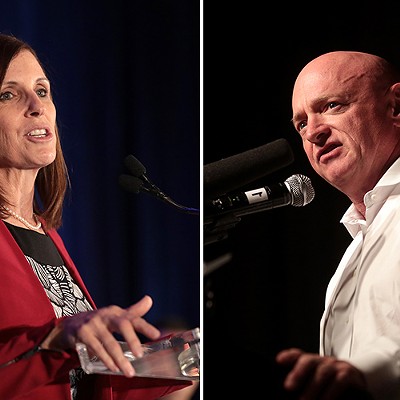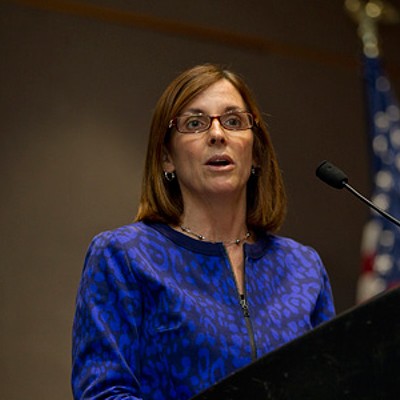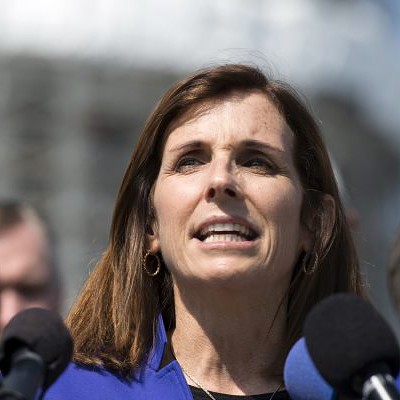Split Decision
McSally votes for the DREAMers before she votes against them
Speaker of the House John Boehner promised a showdown over President Barack Obama's November executive action on immigration once a new Congress was sworn in.
And last week, the showdown came exactly where it was expected: In a battle over funding the Department of Homeland Security.
Congress passed a spending plan for the department, but tied it to two amendments: One, sponsored by Rep. Robert Aderholt (R-Ala.), would prohibit federal funds from being spent to assist with the Obama administration's expanded program providing deportation relief from up to 5 million undocumented immigrants, while the other, sponsored by Congresswoman Martha Blackburn (R-Tenn.), blocked federal funding for the Deferred Action for Childhood Arrivals program that has sheltered undocumented youth who were brought to the United States as children from deportation.
The Southern Arizona congressional delegation split along party lines, with Democratic Congressman Raul Grijalva and Congresswoman Ann Kirkpatrick voting against the bill and Congresswoman Martha McSally voting for it.
McSally said she voted for the funding package because it served as the first step toward improving border security.
She added that she supported blocking the Obama administration's executive action on immigration because it "set a dangerous precedent that threatens the very constitutional principles and separation of powers on which our country is founded. It's critical that Congress, as the direct representation of the people, stand up for those principles."
But McSally was one of 26 Republicans who voted against the Blackburn amendment that targeted the DREAM Act kids.
"It is neither practical nor fair to deport young migrants who freely came forward, giving information such as fingerprints and home addresses to our government, under the auspices that they would be given deferred status," McSally told the Weekly via email. "Those who came here through no fault of their own, have passed background checks, earned high school degrees, and are pursuing the American dream should not be punished for the president's irresponsible action."
But once the amendment targeting DREAMers was approved, McSally voted for the entire legislative package. Her support had Arizona Democratic Party chairman Bill Roe arguing that she had "voted to kick DREAMers out of the country. Now we see the truth of McSally's false claim: she cares more about pleasing the Tea Party than the 'thoughtful moderates' she claimed to stand with. And millions of law-abiding immigrants can now see how little regard she has for them, their children and their hopes and dreams."
Grijalva said that by adding the amendments, Republicans were "playing political games" with the Department of Homeland Security's funding.
"While Republicans claim to be the party of security, nothing could be more dangerous than playing political games with funding for the Department of Homeland Security—especially at a time of heightened alert," Grijalva said. "It's absurd and irresponsible to hold this budget hostage, and to once again threaten a partial government shutdown. These funds are intended to keep Americans safe—not serve the ideological agendas of politicians with axes to grind."
Kirkpatrick expressed similar sentiments and called on Congress to pass comprehensive immigration reform that included a resolution to the status of undocumented immigrants now in the U.S.
"I support a robust, fully funded Homeland Security," Kirkpatrick said in a prepared statement. "What I do not support is cynically tying this agency's funding to a measure aimed directly DREAMers—young people who were brought here as children and call our country home. Telling these kids they cannot attend school, contribute to our economy or enlist in our military is like telling them the American dream was meant for someone else. Instead of taking aim at children, Congress should pass a bipartisan Homeland Security bill—like the one both chambers negotiated last November—and then get back to the important business of comprehensive immigration reform."
The bill's next stop is the U.S. Senate, where it may face a Democratic filibuster. The Obama administration has said it will veto the legislation if it passes Congress.
The Floodgates Open
State lawmakers file more than 700 bills, with more to come
As of The Skinny's Monday deadline, state lawmakers already have more than 700 bills, memorials and resolutions to sort through. Most of those—more than 500—have been filed in the House of Representatives.
Most of them, of course, won't become law. (If you've only got Democratic sponsors, that's typically a sign the legislation is dead on arrival.) We'll be doing a breakdown of the most interesting legislation in upcoming weeks, but there are a few we'd thought we'd highlight this week:
• HB 2407 includes a number of provisions designed to make it harder to put an initiative or referendum on the ballot. Among them: A "Simon says" provision that would void initiative efforts on the basis of minor typos or the like (as courts have previously ruled that "substantial compliance" is a good enough standard to give voters the chance to make laws).
• HB 2051 would ban the use of Temporary Aid for Needy Families funds at fast-food restaurants.
• HB 2283 would prevent state child-welfare officials from removing sick kids from their parents simply because the parents have decided to turn to prayer rather than modern-day medical treatment.
• HB 2071 would allow candidates for public office to request that their home addresses would not be considered a public record.
• HB 2081 would require that Clean Elections candidates gather their $5 contributions to qualify for public funding only by check or money order; contributors could no longer provide $5 in cash.
• HCR 2004 would ask voters to transfer the funding for the Clean Elections program to the state's schools, effectively eliminating the program.
"Zona Politics with Jim Nintzel" airs every Sunday at 9:30 a.m. on KGUN-9.















